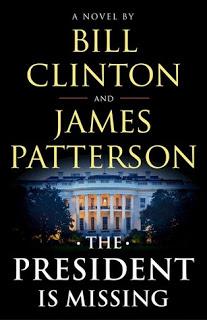‘The President is Missing’, Bill Clinton and James Patterson
‘The President is Missing’ is a recently published 513 page novel authored by Bill Clinton and James Patterson. While this is former US President Clinton’s first novel, James Patterson is a prolific American author who is reported to have sold over 375 million books worldwide. It is therefore, not surprising to learn that Patterson did most of the writing, except for the ending.
Patterson is known for his collaborative writing. Explaining why this time he chose to collaborate with Bill Clinton, he observed that in view of the book’s subject matter, Clinton would provide a level of detail that only a former US President could offer.
The book is a fast paced political thriller about a US President who goes missing in order to avert a threatened cyber attack on the USA, the nature and size of which would turn the US into a third world country. As someone who is barely IT literate I was relieved to find that discussions of the internet, hacking and computing related issues were not only few and far between but also largely in plain English.
Bill Clinton’s input would undoubtedly have been valuable to many aspects of the plot – testimony before the House Select Committee, interactions with the Vice-President, The Speaker of the House, Heads of Security Services, the President’s own staff and with Secret Service agents. Descriptions of the US President’s meetings with other Heads of State and Ambassadors also grow in credibility, knowing that Clinton was involved in writing or advising on the writing.
The book is written mostly from the President’s perspective, which makes it difficult not to imagine Clinton’s narration. This means that what we learn of the other characters is largely determined by what the President knows about them. The main exception to this is a key character whose largely silent perspective provides an exotic, unpredictable and important element of the story.
The book is set in the present and touches on many contemporary social and political issues, further enhancing the realism of this fictitious story. The plot is action filled, has many interesting and unpredictable turns, and the book is written in an undemanding, easy to read style. I have not read any of James Patterson’s many other books and would describe his style as similar to but less cliched and more realistic than a Jeffrey Archer page turner. It is not literature but it is enjoyable and exciting to read.
